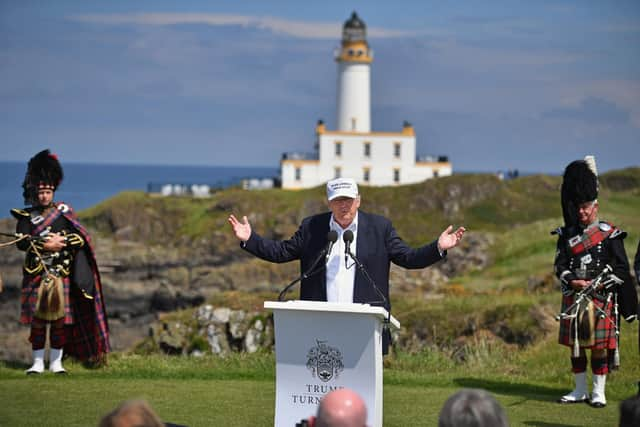'Sound reasons' for ministers 'keeping schtum' over Trump investigation, court hears
Ruth Crawford QC told a judicial review into the Scottish Government’s refusal to pursue an Unexplained Wealth Order against Mr Trump and his companies that there was “nothing impermissible” about ministers “keeping schtum,” arguing that the civil power carried the “taint of criminality.”
Ms Crawford, acting for the government, also urged the Court of Session to “steer clear” from engaging in the merits of whether the requirements for an UWO have been met, and rejected the argument that ministers had an “absolute obligation” to apply for one of the orders.
Advertisement
Hide AdAdvertisement
Hide AdThe review was brought to the court by Avaaz, a US-based non-profit activism organisation, after MSPs rejected calls to pursue an UWO against the former US president's Scottish firms.
The so-called ‘McMafia’ order empowers authorities to target suspected corrupt foreign officials who have potentially laundered stolen money through the UK.
The civil power is designed to force the owners of assets to disclose their wealth; if an official, or their family, cannot prove a legitimate source for their riches, authorities can apply to court to seize property.
Avaaz argues there are "no reasonable grounds" to suspect that known sources of lawfully obtained income would have been sufficient to bankroll Mr Trump's purchases of his Scottish properties.


Neither the government nor the Civil Recovery Unit has confirmed or denied the existence of any ongoing investigation into Mr Trump or his businesses in South Ayrshire and Aberdeenshire.
On the second day of virtual hearings before Lord Sandison, Ms Crawford said there is nothing in the language or framework of the Proceeds of Crime Act 2002 (POCA) to suggest that there was “an absolute obligation where requirements are met to go to the court.”
She said: “The short point is that there will be a number of factors which the ministers are entitled to take into account when considering if and when to seek a UWO. Subject to the public law challenge, my submission is that there is no absolute obligation.”
Ms Crawford said that UWOs have at the very least the "taint of criminality [or] criminal conduct" and that one of the "limbs" of another section of the act is that the property has been funded by illegitimate sources of income.
Advertisement
Hide AdAdvertisement
Hide AdThere were, she explained, “sound reasons” for ministers adopting the “neither confirm nor deny position” prior to any order being sought.
Any disclosure that an UWO investigation was being undertaken, she went on, may “disproportionately taint an individual’s reputation,” if the case did not ultimately reach the stage of an application to the court for an order.
Ms Crawford urged the court to “steer clear” from engaging in the merits of whether the requirements for an UWO have been met.
“It respectfully seems to me that if the court engages with that issue, it is determining whether or not the requirements are established at a time when there is no application before the Court of Session to make a UWO.”
She added: "The court should be very slow to do that. It does in and of itself engage the question of what needs to be shown to objectively establish that the requirements are met.”
However, Lord Sandison said it did not seem to him to be “obviously correct” to say that any ruling that an UWO application ought to have been made would be determining that “the criteria for the making of an order as opposed to the making of an application for the order had been met.”
On being asked to decide on whether ministers had acted unlawfully by failing to seek a UWO, he added: “I don’t think that’s asking me to make a determination, even a shadow determination, of what the result of an application would be, and it’d be rather surprising if it did, if I was being asked to effectively to decide an application that had not been made to the court.”
The court previously heard that there is a dispute over whose responsibility it is to apply for a UWO, particularly between the Lord Advocate - the head of Scotland's prosecution service - and Scottish ministers.
Advertisement
Hide AdAdvertisement
Hide AdThe inquiry heard that the Scotland Act permits Scottish ministers, including the Lord Advocate, to exercise functions with a collective responsibility. It also permits the Lord Advocate to exercise "retained functions", to which collective responsibility would not attach.
Ms Crawford said there was “nothing unlawful about the fact that the Lord Advocate is the minister with portfolio responsibility for part eight of POCA, including seeking an unexplained wealth order."
Responding on the issue of an UWO impacting on someone’s reputation, Aidan O’Neill QC, representing Avaaz, said there was a differentiation between the regime applying to politically exposed persons and those suspected of serious criminality.
The government’s submissions, he argued, collapsed that “absolutely fundamental distinction” which he said was “central to the understanding of this case.”
He said the government’s “refusal” to show its hand meant “no reasons are put forward by the Scottish ministers for their apparent inaction,” despite the fact material put before the court formed the basis upon which it might be said that there were reasonable grounds for suspecting the known sources of income lawfully obtained would be insufficient for the property purchases.
On Monday, Mr O’Neill said the questions around the finances of Mr Trump’s properties were not just focused on how they were purchased, but the “ongoing loss” they have registered.
He told the court: “There have been more details as to precisely how the Trump Organisation has been operating since [2019] which casts light on the issue as to whether or not it could ever be said to have reputable sources, known sources, of lawfully obtained income at the time.”
Lord Sandison said he would issue judgement as soon as reasonably practicable.
